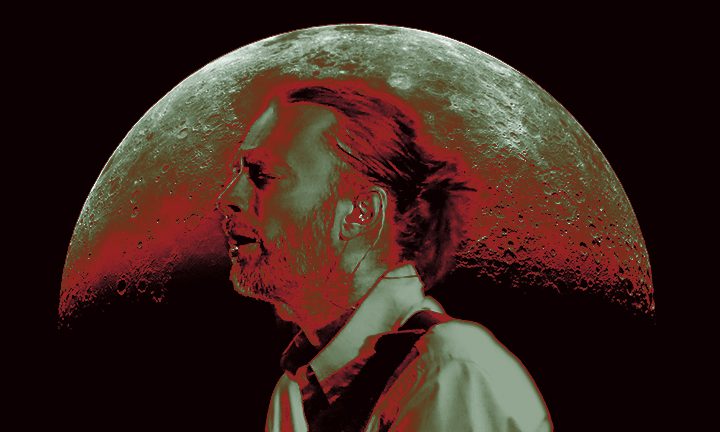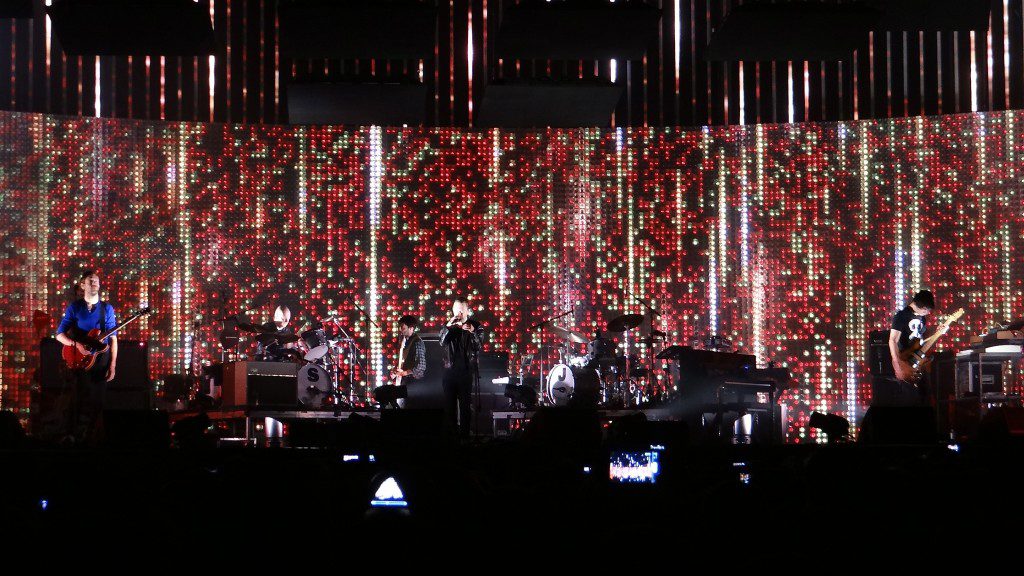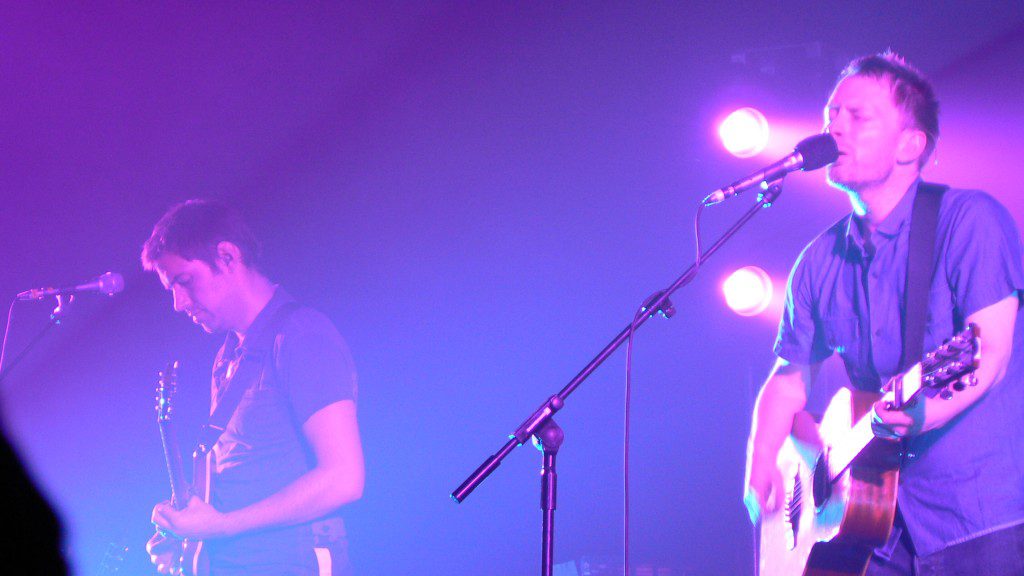
Editor’s Note: This review comes to us from guest contributor Brandon Habermeyer. You can read more of his reviews and commentary at his blog, DonaMajicShow and follow him on Twitter @DonaMajicShow.
Radiohead’s latest album, A Moon Shaped Pool, has been out for a week now and continues to unsettle, dismantle and weirdly uplift me. It plays on auto-loop wherever I go, quietly getting under my skin and dissolving my expectations. This seems to be the standard the band has set since Kid A, always 15 steps ahead of the trend, the pop, the easily accessible. The pattern here? Well, for Radiohead, it might be to erase fandom by continually reinventing the formal language of rock, thereby freeing themselves from the shackles of commercial advice. In this pattern I admit: It’s not always easy listening to Radiohead. Their enigmatic sound can be slippery. They often require you to decode what is not easily decoded, and that can mean elitism for those who don’t get their music. At times, listening to them can feel like doing hard work, where you have to dig, chisel and carefully unearth what no doubt has taken hard work to accomplish, even if it means decoding what appears to sound like airless-machine babble.
I get the feeling that A Moon Shaped Pool was hard to make. Hard to not feel like leftovers from previous albums. Hard to not feel like it needed to capitulate to the band’s famed gloominess. And, most poignantly, hard to not feel like it was saying goodbye, as some rumors have speculated. While listening I found myself needing to separate from these preconceptions, throw on a good pair of headphones, hunker down somewhere quiet, and just bathe in the lunar light of this album’s tremendous heart and soul. Maybe this is what good art forces us to do—get good headphones and, in the spirit of Hail to the Thief, learn to “pay attention.”
A Moon Shaped Pool bleeds with an honest ache. I may even consider it their weightiest album to date, but not because it’s self-parody to say so. It seems to venture into new emotional territories like a letter from an old man confronting the effects of age, divorce and death. For example, the band is aging, time is marching, so forming an exit strategy while remaining genius, I imagine, becomes increasingly hard. In PTA’s “Daydreaming” music video, Thom looks tired and threadbare, and more so than usual. His face bears a syringe-shot full of messy experience, the ultimate drug. Bruised and broken, but he’s learned a lot in the process. Maybe how Yoda would look as human, a wise but cryptic Jedi. In addition, Thom’s well-known history with depression makes his split from Rachel Owen last year even denser, his partner for 23 years and mother of two children. The album seems to shoulder this weight, where on “Identikit” Thom sings, “Broken hearts make it rain,” again and again. Later, on “Ful Stop,” he moans, “You really messed up everything.” The challenge with these interpretations, of course, is that both songs debuted with more or less the same lyrics in 2012, three years before the split. Naturally, separations don’t occur over night, but it’s possible these emotions were already surfacing from Thom’s psyche. I don’t want to dig too deep here, but this feels more like rhapsody than therapy. As my brother recently tweeted, “This is the sound of an old, broken band saying, “We’re at the end of our journey, but can we muster creative reserves for one last classic?”
No Radiohead album really feels complete without an introspective, panged mood. Ironically, this new album somehow manages to swim upstream beyond the existential clouds like watercolor; dripping and swirling like a prolonged version of “Codex.” It glows with a certain warmth and compassion I haven’t heard on previous albums. It basks in moments of profound beauty and deep, enlightened emotion, not too unlike an old man looking back on his life and waxing nostalgic over what was, is or could have been. Think Johnny Cash here covering Nine Inch Nails’ “Hurt.”
To make this new feeling of LP9 sink in, review with me briefly the expansive spectrum of Radiohead’s mood. Think about what OK Computer did to The Bends—it stripped away the stadium elements of guitar-anthem rock and technologized a new textured soundscape that felt more like eerie-spacey science fiction than twangy rock and roll. Think next about what Kid A did to OK Computer—it almost entirely pureed those lovely, immediate space lullabies into soup, adding now a scary electronic palette that experimented more with noise and possibility than with formal hooks, riffs and bridges. While there certainly are hints of both albums in A Moon Shaped Pool, LP9 largely dispenses with alien-angst rock and intrusive, falling apart electronica (a young man’s game). It favors instead a gentle piano and some gorgeous strings. These feel more like the instruments of nostalgia. The instruments of mature men—their memories, pains and joys, and the long roads they’ve walked. We can thank Jonny Greenwood for his tremendous influence here. He stands just as much at the fore as Thom on this album.

With this more personal and enlightened approach, it seems almost strange to have a menacing track like “Burn the Witch” open for the album. The song is terrifically terrifying, one of their best openers I think, even if what it portends is misleading. Bold, dark and brooding, the song is driven by a burst of quick psychotic strings that build to easily one of the best nightmarish climaxes the band has ever arranged. I mean, the daggers of this song. Good night. Listen to that gnashing end-crescendo again and tell me you don’t hear the staccato knife of Norman Bates repeatedly stabbing Marion Crane. Am I right? Like the calm after the storm, “Burn the Witch” perfectly transitions into “Daydreaming” (the album’s “How to Disappear Completely”). It feels like a water-droplet lullaby sliding across a pane of glass, dreamier than its dreary predecessor. The piano is soft and contemplative. The dread is over and we can now recover…well, maybe. I’ve experienced this same shift in moods in previous albums. It’s what Radiohead does best. “Everything in its Right Place” to “Kid A” comes to mind, or “2 + 2 = 5” to “Sit Down. Stand Up.” The pairings are yin and yang, layered then pulled back, spacious then stripped down. It’s not an exact science by any stretch, and sometimes the patterns are self-contained within the songs themselves.
PTA’s “Daydreaming” video also reveals its fascinating connection to “Pulk/Pull Revolving Doors.” Thom is seen walking through myriad doors (23 to be exact—a coincidence with his breakup?) where each one seems to move him up and out, higher and higher, beyond the plastic metropolis below, deeper into nature. If this video is any emblem of falling through a series of “trap doors” (maybe Thom’s struggle with depression?) the irony only swells as it nears the end. Here Thom is seen ascending (notice, not descending) a snow caked mountain into a dark, dimly lit ice-cave. The sweat equity he’s purged certainly deserves more than this, yet here he is—alone, cold and ready for bed, as though the higher we climb the lonelier, heavier we become. Completely antithetical to what we’d normally ascribe with moving “up,” climbing “higher,” “ascending,” or “progressing,” etc.
Onto “Decks Dark.” Exclamation point! What an awesome surprise it was to discover this gem, probably their most Radiohead sounding song on the album. This is a brand new track, never even been teased previously, but for me was an ethereal throwback to “Subterranean Homesick Alien” with its marvelously relaxing tempo yet equally spooky nocturnal edges. The piano here is sweet and beautiful, even though what Thom is lyrically getting at expresses fear and paranoia: “In any old life there comes a darkness / There’s a spacecraft blocking out the sky / And there’s no way out … / We are helpless to resist / In our darkest hour.” Following these verses a choral of ghostly voices enter, serenading what sounds like gothic mourning straight out of Edward Scissorhands. Hauntingly memorable. Maybe even magical. Listen up Danny Elfman—you will get goosebumps. Sinking deeper into my headphones I just want to get swooped up in a country lane and hear this song performed live on the moon. Afterwards I want the band to give me a private tour of the Milky Way. I don’t think this is asking for much.
In “Desert Island Disk” a folk-twang, noir-like blues emerges. The song rides on a linear sunset rhythm, already feeling like a classic long distance road-trip groove. I picture myself in a convertible on twilight highways: soft-top collapsed, hair blowing, and sunlight dancing between purple mountains and orange farmhouses. Here, I feel “totally alive in my spirit light.” And from here, it’s an absolute trip to then be gradually preyed upon and seduced by the ominous krautrock-inspired “Ful Stop,” a track that debuted during the 2012 The King of Limbs tour along with “Identikit.” The song feels like it probably belongs on TKOL, too, given its muggy, dark night of the soul detachment, but it’s a sound I’ve grown to relish regardless where it’s placed. Its obscure mélange of synthesizers and space-invader guitars is also a sound the band has been working on for years, and here feels textured enough to be the younger brother of “These Are My Twisted Words,” another krautrock standalone released in the summer of 2009. The mood of “Ful Stop” pulsates with red fever. It drones layers within layers. It buzzes like a fridge, getting dizzying at times, so much that when Thom murmurs, “Truth will mess you up,” the moonstruck will believe him.
There are really no wasted moments or weak tracks on A Moon Shaped Pool, but there are songs that affect me less emotionally despite stirring me intellectually. “Glass Eyes” for example. Did Thom write this in an abandoned cabin while on retreat in Walden Pond? There’s a serious reflection and inwardness here craving escape from the remnants of anything human. It just wants to delve headlong into isolation. Thematically this makes sense for a Radiohead song. It shares familiar ground with certain Kid A and Amnesiac tracks, two albums that exude information overload and alienation. I would compare the mood of “Glass Eyes” with “Life in a Glass House,” only with the caveat that the psychedelic brass in “House” has been replaced with weeping strings. The melody bleakly dialogues between voice and piano, subtly making room for those quivering, glassy strings to peak with somber intensity, then roll over like waves on a shore. It’s a muted poem, a thoughtful journal, and intellectually it’s a fascinating conversation to eavesdrop on. Emotionally, however, it feels too private for me to fully access. It works better as philosophy than music, which makes me think this might be Radiohead at their most impressionistic.

If you don’t agree with me on “Glass Eyes” you certainly won’t agree with me on “Identikit.” The song oddly takes me into nostalgia. Deep 8-bit Nintendo nostalgia, that is. To preface, let me ask a silly question: Was Radiohead at all inspired (even just a tinsy bit) by Megaman 2? Jonny’s a gamer, right? Maybe it’s possible? There’s no immediate connection at first, probably not until the last two minutes, but as the song progresses and Thom’s voice inflects over needle-pick guitar riffage, the spidery but distinct MIDI-theme of Bubble Man emerges. Might even be some Ninja Gaiden in there too, but the MIDI resemblance is undeniable. I mean, the guitar here sounds more like a keytar. It’s just a shame the song ends abruptly right after Jonny’s solo; otherwise, he would have probably ventured into Castlevania. Jest aside: “Identikit” is a standout exercise in sound sculpting minimalism. The trilling choir that washes away Thom’s chant—“Broken hearts make it rain”—reminded of Sufjan Steven’s Age of Adz, where a symphonic echo swirls between eerie electronica and a barbed guitar. The transition then into the “The Numbers” (formerly “Silent Spring” when Thom played it acoustically solo) is welcomed as perhaps the most robust, balls-to-the-wall song on the album. It’s a different kind of knockout bravado than “Burn the Witch,” wherein bluesy pianos and acoustic guitars careen through lonely, spectral, folk frontiers. It feels like a storm is coming, yet, strangely, with an optimistic promise: “The future is inside us / It’s not somewhere else.” Lyrically, this is the most hope and sunshine Radiohead has offered in years, even though tonally there seems to be precaution. Definitely one of my favorite tracks.
Can “Present Tense” be any groovier than it is? This is a track that dates back to a 2009 solo performance; a later 2013 performance during Thom’s Atom’s for Peace tour reveals a pretty funny moment, too, when Thom literally stops the show to chew out a group of loud, obnoxious fans who clearly aren’t respecting the art. Damn straight, because this song is dead sexy. That shifting samba-percussion, those warm finger-plucking chords, Thom’s angelic sighs—all of this enmeshed with a swooning bossa nova rhythm that splices and layers fragmented vocal loops into a jamming Latin collage. I want to get lost in this song dancing flamenco while high on Spanish Fly. Just “keep it light and keep it moving” feels like a message for our bodies. The song just hangs like that. It is certainly one of the more upbeat Radiohead songs I’ve heard in awhile, maybe since “Lotus Flower” or “Weird Fishes/Arpeggi.” The bump in cadence then transitions smoothly to another wavy but snail-paced beat, the band’s most verbose track name to date: “Tinker Tailor Soldier Sailor Rich Man Poor Man Beggar Man Thief.” I will not write that name again. To say the least, the electro bass and cellos in this song steal the show. Twirling like kaleidoscopes against the erotic piano of “All I Need,” the strings take power from the bass as they hover and haunt, duel and churn down Alice’s rabbithole with dizzying magnanimity. This is a song that builds on the steady layering of simple parts to reach its chaotic conclusion, thrust into the static void of a broken record player. Is the album now over?
Not quite. Not without closing out the album with a two-decade history fan favorite, “True Love Waits,” a fragile, star-crossed soul ballad that debuted during the 1995 The Bends tour. The evolution of this song from stage to studio has been a tireless effort. The band’s patience to release it within the right framework certainly reveals their love of the song. Nigel Godrich, the band’s producer and recording engineer, commented in 2012: “We tried to record it countless times, but it never worked. The irony is you have that shitty live version. To Thom’s credit, he needs to feel a song has validation, that it has a reason to exist as a recording. We could do ‘True Love Waits’ and make it sound like John Mayer. Nobody wants to do that.”
I will be honest: I initially had a hard time revising my expectations with this one. Like an undisciplined Radiohead fan, it wasn’t till I heard the song on A Moon Shaped Pool that I realized just how strongly I was attached to “that shitty live version” performed in Brussels in ’95. The recording on LP9 has a very elusive shape, including the way it drifts into nothingness and yearns more for definitive form. Unlike the Brussels’ version, which has clear acoustic chord changes enhanced by a carefree keyboard, this new version abandons those corporeal edges in favor of sparse, ambient pulses. There’s also a riveting but subtle electronic bass underscored by a chaotic piano taking cues from classic minimalism. If you listen closely, you can hear the contrapuntal sound of young puppy love being drowned in a kind real, visceral love; one that takes its toll on the body as it pays bills, washes dishes and changes diapers. That is the true love of “swollen feet,” a love that decays the body over time, leaving Thom sounding stranded and spiritually aching. The former love is but a fading memory now, abstract without form, without body, making Thom’s final plea “Don’t leave” an utterly enlightened lamentation. It took both versions of the song for me to realize this, but once that happened it hit me like a bomb. This is absolutely soul-crushing stuff, but it works so triumphantly well because it’s true.
A Moon Shaped Pool is an impressive, fully realized album. It has been cared for and loved, given plenty of time to breathe. If this really is a goodbye, I can think of no better way than to grandstand the band for the incredible craftsmanship, atmosphere and enlightened tone they’ve weaved together. Can’t wait to hear how it will translate live come August.
Like Peculiar People on Facebook:











